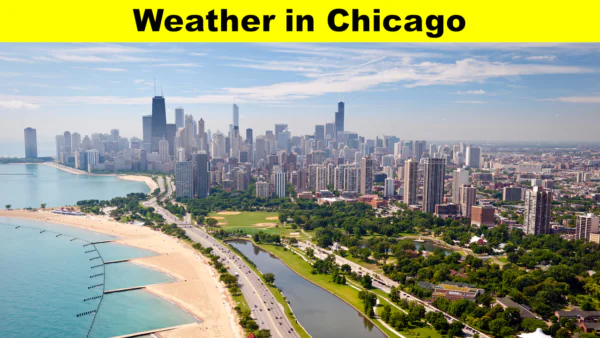Weather in Chicago: Based on NeemTime research
Weather Overview of Chicago
Chicago experiences a humid continental climate, characterized by four distinct seasons with cold, snowy winters and hot, humid summers. Weather can be unpredictable, especially in spring and autumn, with sharp temperature changes. Lake Michigan influences the city’s weather, moderating extremes but also contributing to lake-effect snow in winter.
Weather Seasons of Chicago
Winter (December to February): Cold and snowy, with frequent sub-freezing temperatures and occasional blizzards.
Spring (March to May): Gradual warming with frequent rain and thunderstorms; can still experience occasional snow in March.
Summer (June to August): Hot and humid, with temperatures often rising above 30°C (86°F) and sudden thunderstorms.
Autumn (September to November): Cooling temperatures with colorful foliage, crisp air, and occasional early snow in late fall.
Month with the Highest Temperature of Chicago
July is the hottest month in Chicago, with average high temperatures around 29°C (84°F), though heat waves can push it above 32°C (90°F).
Month with the Lowest Temperature of Chicago
January is typically the coldest month, with average lows around -9°C (16°F) and highs near -1°C (30°F). Arctic blasts can bring temperatures far below zero.
January Weather of Chicago
January is bitterly cold, often with snow and ice. Average temperatures range from -9°C to -1°C (16°F to 30°F). Wind chills can make it feel significantly colder, and snow accumulation is common.
February Weather of Chicago
February remains very cold, with average temperatures between -7°C to 2°C (19°F to 36°F). Snow continues to fall, but daylight hours begin to lengthen and occasional mild days occur.
March Weather of Chicago
March marks the beginning of spring but often still feels wintry. Average highs climb to around 8°C (46°F), while lows hover near -2°C (28°F). Snow is still possible early in the month, gradually transitioning to rain.
April Weather of Chicago
April brings noticeable warming, with highs around 14°C (57°F) and lows near 4°C (39°F). Rain showers are frequent, and the city begins to green up, though chilly days and occasional frosts still occur.
May Weather of Chicago
May in Chicago is a true spring month, with temperatures ranging from 10°C to 21°C (50°F to 70°F). Rainfall increases, and thunderstorms become more frequent. The city begins to bloom, and outdoor events start gaining momentum.
June Weather of Chicago
June marks the start of summer, with warmer days and longer sunlight hours. Average temperatures range from 16°C to 27°C (61°F to 81°F). Humidity increases, and rain comes mostly in the form of scattered thunderstorms.
July Weather of Chicago
July is typically the hottest month, with average highs around 29°C (84°F) and lows near 19°C (66°F). Humidity can be intense, and heatwaves are common. Lakefront areas offer some relief from the inland heat.
August Weather of Chicago
August remains hot and humid, with temperatures between 18°C to 28°C (64°F to 82°F). Thunderstorms still occur, but the weather starts to slowly ease into cooler conditions by late in the month.
September Weather of Chicago
September brings a transition into fall. Highs range from 15°C to 25°C (59°F to 77°F). Humidity drops, and the city enjoys comfortable weather with less rainfall. Early fall colors may start to appear in the latter half.
October Weather of Chicago
October is cooler and more crisp, with highs around 13°C to 18°C (55°F to 64°F). Nights can be chilly, and frost becomes possible late in the month. Fall foliage is at its peak, making it a scenic time in the city.
November Weather of Chicago
November turns colder, with temperatures between 1°C to 10°C (34°F to 50°F). Rain is frequent, and snow can begin to make appearances, especially toward the end of the month. Days become shorter and grayer.
December Weather of Chicago
December is a full-blown winter month, with average highs of -1°C to 4°C (30°F to 39°F). Snow is common, and the festive season adds charm despite the cold. Lake-effect snow may impact areas near Lake Michigan.
